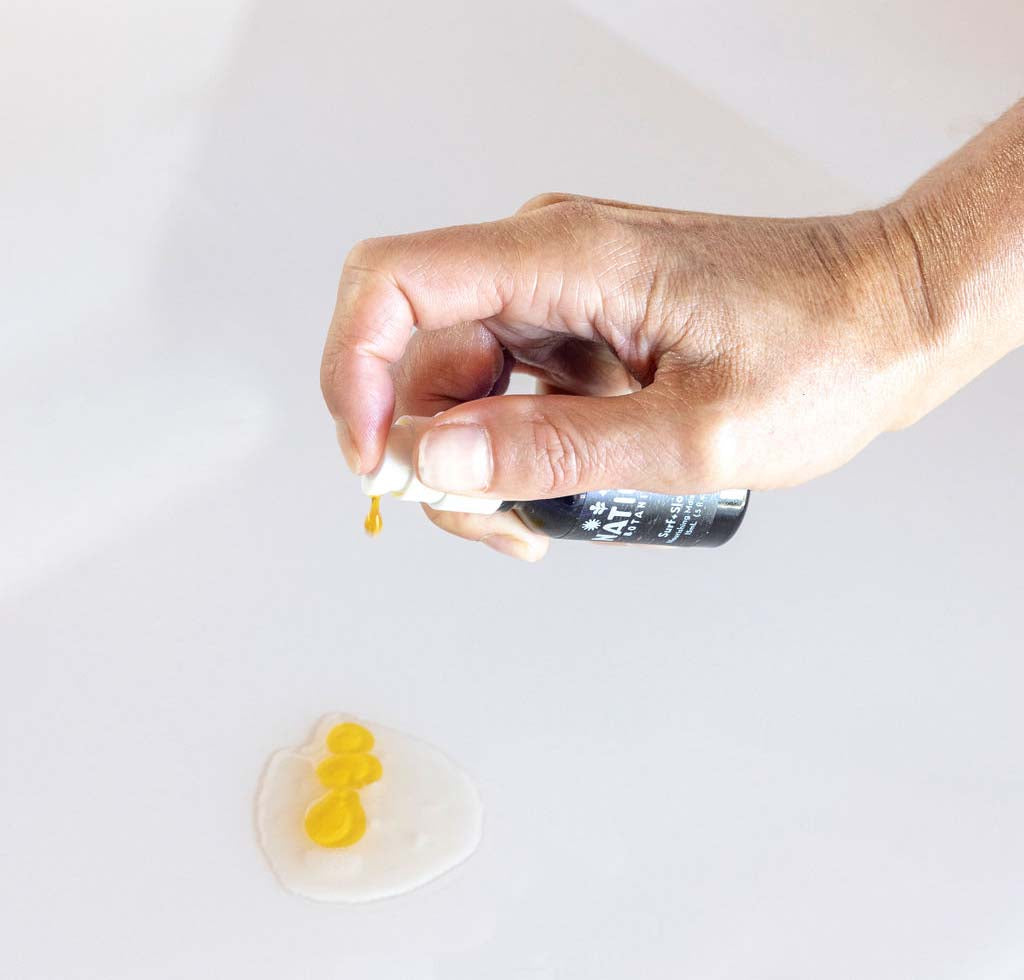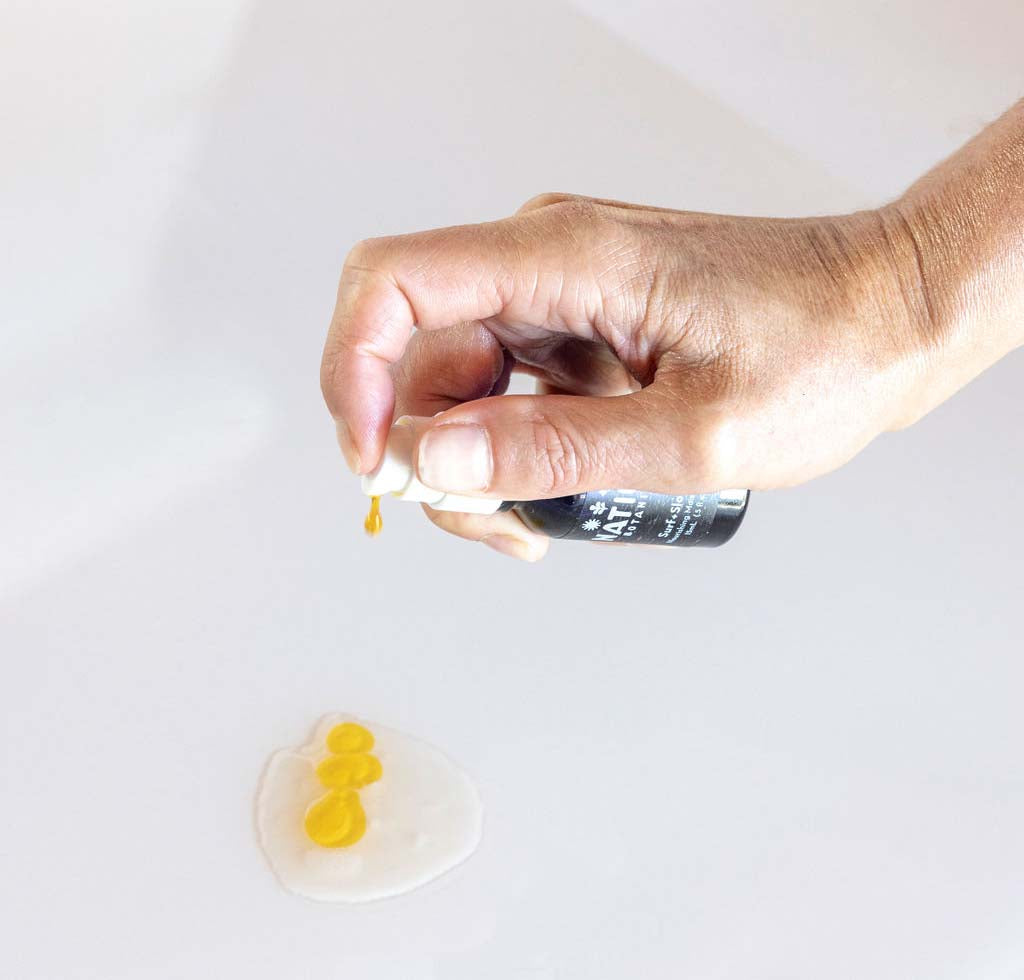


· By Mercedes Pepper
Hydration + Moisture = Healthy Skin
When thinking of moisture and hydration, you might think of morning dew glistening on your surfboard or your still damp ski boots. Or rehydrating your body with coconut water. Connecting the dots between moisture and hydration for your skin doesn't readily come to mind. Well, yet…
I'm gonna let you in on a little secret: hydration + moisture = your healthiest and more youthful-looking skin.
Countless research shows how this pair is the key to overall good skin and preventing and reducing the appearance of wrinkles and skin damage. Yet, many skincare product slingers don't necessarily want us to realize this... Cause they want us to buy their 6+ skincare steps! Yeah, no thanks.
Moisture and hydration while often tossed around interchangeably in skincare are very different when it comes to your skin. Your skin needs both moisture and hydration to support its overall health, resilience, and function.
To put it very simply, hydration is water and moisture is oil. When your skin has both of these it's healthy. Meaning it has a healthy skin barrier (more below on what the heck this means) that is nourished. As some say, that's giving your skin an “optimal glow for pure radiance.” Together, hydration and moisture are going to make your skin look plumper - aka fill in those fine lines - maintain its firmness, and help keep it protected, naturally.
Moisture and hydration are key if you want to help slow the signs of aging, protect the skin you've got, and have overall healthy good-looking skin.
So, I'm going to break it down for you exactly why hydration and moisture work and why you should care.
First, I get it, you're not a skincare geek so why would you wanna get into the nitty gritty on this? Well my friend, understanding the difference between the two is going to make understanding the whole skincare routine and ecosystem much easier, which saves you money and time, and helps you easily take care of your surf-to-slope skin.
Those Riding the Waves and Hitting the Slopes Need Them More
I'll be real. If your skin lacks both moisture and hydration, you're gonna look a bit more rugged than you need to...
This is because when you have dry skin or dehydrated skin it's prone to aging faster as it's more susceptible to the damaging effects of UV exposure, pollution, and oxidative stress. Plus, it accentuates your face's fine lines and imperfections - we all have them, but might not be ready to fully highlight them!
If you want perfect skin, you've basically got to protect it from UV radiation, sunburn, pollution, harsh weather, and well the environment. Yet, that's never gonna happen for us! We live to get outside, to go ride the ocean's waves and hit the mountains' powdery slopes.
We put our skin through all sorts of stressors and harsh elements - from blistering winds to extreme glare - surfing, skiing, and snowboarding. But those natural extreme elements are all part of it.
Yet, your skin is like a shield against these environmental stressors, so if it's strong and healthy - moisturized and hydrated - it's going to be able to fight off and deflect these harmful elements better. We're talking about your natural skin barrier whose job is to help protect your skin, not sunscreens that protect your skin from UV rays (that's important too, but a topic for another time).
You may be rugged, but if you bring on the hydration and moisture your skin doesn't have to reveal how well-traveled and adventurous you really are…
As a surfer, skier, and/or snowboarder your face constantly gets sun exposure - or free radical damage - so we want to make sure our skin's healthy enough to naturally defend against. To keep your skin healthy.
This is what the skincare industry jargon would term prevent premature aging. By ensuring you're nourishing your skin with adequate amounts of hydration and moisture you're helping to slow the signs of skin aging. This includes proper hydration of your body too.
Now who doesn't want that?!
Making sure your skin is properly hydrated and moisturized isn't rocket science, and doesn't require multiple bottles and steps. Or even the most expensive skincare products on the market!
Let's bring it back to the basics.
And the basics are rooted in our skin's composition.
Basic Skin Anatomy
You're probably familiar with the fact that our bodies are made up of mostly water, which means our skin contains water too. Specifically, our skin is made up of approximately 80% water, while the other part of our skin essentially consists of lipids, known as oils or fats. These two elements of water and oil are reflective of our skin's structure.
Our skin - we're talking human skin here - consists of two main layers. These layers are known as the epidermis and dermis.
The epidermis then has five layers, one of which is the outermost layer formally called the stratum corneum. Or commonly known as the skin barrier because it acts like a natural barrier, or say wall, for our skin and bodies.
The dermis has two additional layers and is responsible for the skin's elasticity and strength as they produce collagen fibers and elastin fibers.
These two main layers - epidermis and dermis - are made up of water and oil-loving compounds. Or what we'd scientifically refer to as a skin structure that's composed of a lipophilic structure on the surface and hydrophilic layers below.
In easier-to-understand terms, the top layer of the skin (epidermis) is lipid-loving and the deeper layers of the skin (dermis) are water-loving.
If we've got two layers of our skin where one is water-loving and the other oil-loving, then it makes sense why we'd want to feed it both.
Water + Oil = Hydration + Moisture
Put simply, hydration is present in the deeper layers of your skin - the dermis which is water-loving - while moisture is present in the outer layers of your skin - aka the skin barrier you see or the epidermis which is oil-loving.
What's the difference between moisture and hydration?
We know our skin is made up of water-loving and oil-loving compounds and these both work to keep moisture and hydration in our skin. Technically, both are related to keeping water in our skin. But let me explain a bit more about how each of them does it differently.
Hydration refers to increasing the amount of water in the deeper layers of the skin.
Specifically in the deeper layers of the skin where collagen, elastin, and other structural components are located. Well-hydrated skin supports collagen production and the skin's natural repair abilities making it appear firm and resilient.
Moisture refers to the amount of water present on the skin's outermost surface, the skin barrier.
Moisture is important for maintaining the skin's suppleness, smoothness, and overall appearance. And it plays a key role in naturally protecting the skin from external stressors.
How can I boost my skin's moisture and hydration?
Good news, a few ways!
Not to get too technical here, but moisturizers are a blanket term for the four different types of ingredients you can use to give your skin hydration and moisture.
- Emollients
- Occlusives
- Humectants
- Miscellaneous moisturizing ingredients
And of these four above two of them are oil-loving - emollients and occlusives - and the other two water-loving - humectants and miscellaneous moisturizing ingredients, including aloe and botanical ingredients.
Hydration is brought to the skin through water-loving ingredients.
These include humectants and other moisturizing ingredients that are water-soluble.
What's a humectant?
Humectants help absorb water from their surroundings, bring it into your skin, and retain it. They increase skin hydration as your skin's water content is increased.
Glycerin and hyaluronic acid are well-known humectants.
But did you know that hyaluronic acid is a natural humectant found in both the epidermis and dermis?
This water-loving compound plays a big role in how your skin heals wounds, defends against UV damage, and well overall skin aging. Yup, that's why we use it - learn more here.
What are the various other moisturizing ones?
This water-soluble category includes botanical ingredients - such as aloe vera in Surf+Slope and other plant actives, juices, or powders - and proteins like collagen and elastin.
Also, remembering to stay hydrated from within helps your skin from the inside out. Also helps with your overall bodily functions - especially after working up a sweat bootpacking or living in salt water. So chug that simple yet pure water, coconut water, or fancy electrolyte supplement of your choice.
Moisture is brought to the skin through lipid-loving oils.
These include emollients and occlusives that are oil soluble.
What's an emollient?
Emollients replace lost lipids on the skin's surface, soften and smooth skin, and provide protection on the skin's surface. This protective yet thin layer helps to minimize chafing - thinking of your ski jacket - and promotes a smoother texture.
These include pretty much all oils and butters. And why we've chosen some of the best ones native to North America!
What's an occlusive?
Occlusives - like emollients - are lipids yet uniquely create a protective barrier on the skin to lock in moisture. This layer essentially blocks water from leaving your skin.
Transepidermal water loss (TEWL) is the natural process of water evaporating from your skin, yet as we want to retain water in our skin cells this is where occlusives come in.
Occlusive oils - such as our meadowfoam seed oil and pracaxi seed oil - work to retain moisture and hydration in your skin by inhibiting TEWL. They work kind of like a sealant.
Pro tip: Avoid harsh cleansers - say no to skin with a squeaky clean outer layer! - as they strip your skin of oils - your natural oils, emollients, and occlusives - that can then weaken your skin barrier from its natural abilities to shield you and lead to other conditions like dryness.
The building blocks for skin health are to keep your skin hydrated and moisturized. An easy way to think about it is how you can target:
- Dehydrated skin with hydrating ingredients. And further, avoid dehydration by drinking water and maybe not having long showers in hot water after a parched day!
- Dry skin with occlusive and emollient ingredients or oils.
Common Question: Does oily skin need hydration and moisture?
Any skin type and skin concerns including acne are prone to dryness or irritation. In the absence of hydration or moisture, the skin will overreact and create a lot more oil to keep it safe. It results in an oilier complexion with enlarged pores. Hydrating serums containing hyaluronic acid and aloe vera, such as Surf+Slope's Revitalizing Serum, can help replenish hydration in oily skin. Moisturizers with occlusive and emollient ingredients with a fatty acid profile high in linoleic acid - aka Omega 6 - are surprisingly great for acne prone skin. That's why our moisturizer uses black raspberry seed oil and cranberry seed as they both contain linoleic acid and are incredibly light and rapidly absorbed.
Alright, now we can bring it back to why this matters!
We now know our skin is made up of water and oil-loving compounds - aka two layers - and there are four categories of ingredients that can nourish each to provide moisture and hydration.
So, you should be with me here that it's only logical you'd want to feed your skin both water and oil-based nutrients that fall in each of the four moisturizing blocks - emollients, occlusives, humectants, and other ingredients. This way, you're covering all your bases for healthy skin.
How does hydration and moisture help your skin?
It targets both dry skin and dehydrated skin (which are different).
If your skin has optimal levels of both water and oil-based nutrients it's going to maintain its firmness and elasticity, look plumper - you know, fill in those fine lines - and have a good barrier function, which'll give you a healthy glow.
Healthy skin has a very good barrier function which can naturally help protect your skin from environmental stressors and “prevent any chemicals or microbials from entering your skin.” This is important because a healthy stratum corneum, or known as the skin's barrier, is “impenetrable to irritants and allergens, and water loss is minimized.”
When the skin barrier - the outermost layer of the epidermis, the stratum corneum - is damaged by sunlight or other environmental stressors the skin reacts negatively by showing irritations, allergic reactions, signs of aging, and slows wound healing. Additionally, when the dermis's collagen fibers and elastin fibers are damaged - by say the sunlight we love - our skin loosens, becomes thinner, and wrinkles emerge.
So by keeping your skin properly moisturized and hydrated, you're keeping your skin healthy, strong, and resilient to all the extreme conditions we put it through.
Nation Botanics' Surf+Slope is Hydration and Moisture
Two bottles that seem like a basic oil and water can seem boring. I get it when there are fancy emulsions/creams out there.
While our approach may seem simple, it's effective.
It's the best skincare routine for dehydrated and/or dry skin.
Each bottle contains plant nutrients in their purest forms of hydration and moisture (no fillers or in-actives found commonly in creams here!).
One is filled with water-loving plant ingredients - hello hydration - and the other lipid loving - yes to moisturizing oils! You increase your skin's ability to be healthy when you've got both!
You customize the amount of hydration and moisture your skin craves. Now that's adaptive skincare.
This way Nation Botanics gives you the best of both worlds for your healthiest skin while empowering you to adjust the levels of moisture and hydration your skin needs that day, week, month, or season.
Cause hey, our skin changes based on where and what we're doing outside.
Some days it's very dry skin, or flaky skin, so it needs more of our moisturizing oil, whereas others it feels dehydrated or sun-kissed so needs a little extra of our hydrating serum. Or you cover all your bases and use equal amounts of both!
Check out Surf+Slope Revitalizing Serum and Nourishing Moisturizer now.
Or if you're not ready to commit to a supreme product like Surf+Slope - cause it isn't cheap - check out Nation Botanics' FREE Guide: Budget-Friendly Skincare Secrets: 2 Crucial Tips + 6 Easy-to-Find Products.
